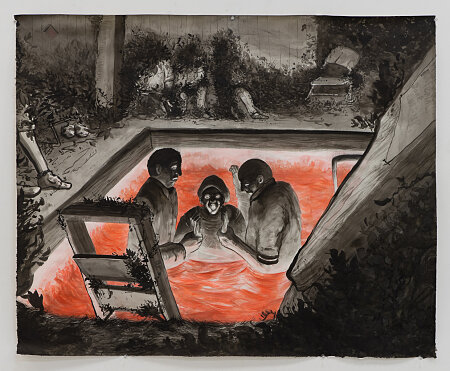
Before Paris
“Humm, humm, humm,” the concierge intoned as he read the letter. Then, his eyes narrowed. His lips tightened, and he stared at the man with a mixture of sadness and bewilderment. He reached out and grasped the man’s shoulder.
“Cher Jean,” he said as he shook his head mournfully. “Cher Jean,” he repeated.
When the man returned to his room, he remained unnerved, although not totally certain about the translation of his wife’s letter. She had made it clear, according to the concierge, that she was becoming more comfortable with scarf-draped tourists than with her Midwestern American husband. She wrote of their shared appreciation for Cézanne’s apples—the ease with which the tourist swept his hand before the canvas; the delight with which she fell into his ease. And there were the smaller things—that he was drawn to her Catherine Deneuve hat and she to his herringbone jacket.
The man dropped into the chair near the desk. He held up the letter and began to read it himself, nearly convinced that he had a grasp of the language, a grasp of his wife’s words after so many years. Some words he could translate— “desir” and “envie”—but no mention of “amour.” Some words he did recall from the concierge’s translation—sorrow, impulse. Yes, impulse, and the man found that word most puzzling. Before Paris, every choice she had made in her life had been thought out—the prairie revival home, the purchase of the alabaster vase, the Wyeth print, the Moroccan rug—and the planned placement of each. Before Paris, no action she ever took, no word she ever spoke, in any language, hinted of spontaneity. Even her final letter, beneath the sorrow, unfolded with an unmistakable logic—as far as he could tell. Then, his desire to read the entire letter faded, and he could barely distinguish one French phrase from the next. He envisioned the scarf-draped tourist. Was his touch spontaneous? The presumptuousness of his laughter? His comments about Cézanne, about tables and cloths and apples? It was all quite disconcerting.
Uncertain of his wife’s plans and eager to leave behind all things French, the man packed his things and wheeled his luggage to the front desk. He slid his key toward the clerk. At the edge of the desk sat a tourist book on Europe—a bookmark selectively placed at the chapter on Paris. As the clerk processed his American Express, the man flipped through the pages to a folded map in the center. He opened the map and passed his hand over Europe, pressing his finger into France and Germany, Spain and Portugal, Italy, touching all the countries in Europe whose languages his wife spoke.
“Excusez-moi,” he called to the desk clerk. “Greece?” he asked quietly, and he spun the map toward the clerk and pointed out the land mass he’d identified.
The clerk looked at the man and nodded.
“Oui,” the clerk said. “Grèce.”
“Grèce,” the man repeated with deliberation. “Greece?”
“Grèce,” the clerk said.
“Greece,” the man said.
He focused on the colorful depiction of the island nation. He conjured images of Athens—the Parthenon, the Erechtheion, the fixed and assured remnants that he was certain his wife, in her current blithe state, could not have considered, even if she could speak the language. He imagined her teetering between an ethereal and grounded future. Did their destiny lie not in France or Nebraska but in Greece? Would that encourage her return to him? Of course. The country’s name said it all. Something about the word, the sound—certain, secure, lasting.
“Greece,” the man said and tapped onto the map.
“Grèce,” the clerk repeated.
He squinted into the page—the mass of land, the surrounding sea, its name printed boldly across the colorful image.
“Grèce,” the man said.
